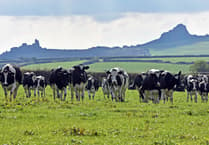The Farmers’ Union of Wales has described the UK Government’s approach to food security and agriculture as reckless in response to the announcement that a liberal trade deal has been signed with New Zealand.
FUW president Glyn Roberts said: “Farmers are extremely angry that the UK Government is pursuing trade deals that their own figures confirm will be damaging to our food and farming sectors and undermine our food security.
“We need look no further than what is happening in Ukraine and in relation to gas and fuel supplies to see how rapidly things can change on the global stage, yet the UK Government’s trade policy is recklessly undermining our food security by shifting reliance to countries that are tens of thousands of miles away.”
The agreement would see the amount of beef that can be imported tariff-free from New Zealand rise to 12,000 tonnes now, then to 38,820 tonnes in 10 years’ time. Further rises would occur in the following five years, after which there would be no limit.
For lamb, the amount that could be imported tariff-free would increase by 35,000 tonnes per annum in years one to four, then by 50,000 tonnes per annum in years five to 15, after which there would be no limit. Tariffs on cheese and butter will be phased out over five years.
“The impact assessment for the deal estimates it will lead to a fall in the GVA of the sector categories into which food and farming fall of £129 million, which they admit is ‘primarily driven by increased import competition in beef’,” said Mr Roberts.
“This would be on top of an estimated fall in the GVA of those sectors of £278 million as a result of the equally liberal deal signed with Australia.
“Meanwhile, the benefits to our economy as a whole would be miniscule - an estimated increase of 0.03 per cent in our GDP, meaning we would need around 130 similar deals to make up for the reduction in our GDP anticipated as a result of Brexit.”
The UK Government’s impact assessment suggests that wages could rise by 18 pence a week as a result of the UK-New Zealand trade deal.
“The cumulative damage to our food and farming sector of these deals and others that are in the pipeline at a time when rural budgets are being slashed and regulations for our own farmers are being hiked up hardly sends out a positive message about the UK Government’s support for agriculture,” Mr Roberts added.
“There is a growing feeling that these policies represent an existential threat to our rural communities and food security.”



.jpeg?width=209&height=140&crop=209:145,smart&quality=75)

Comments
This article has no comments yet. Be the first to leave a comment.